Walter Ledermann - Encounters of a Mathematician
Edinburgh: 1936-8 and thereafter
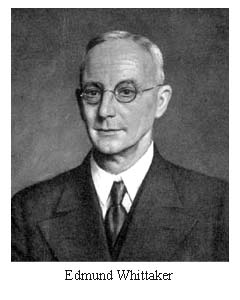
During the first half of the last century Professor E. T. Whittaker (Sir Edmund Whittaker, as he was later to be) was one of the most respected and influential mathematicians in the United Kingdom. Indeed, it was said that no Chair of Mathematics anywhere in the British Empire could be filled unless Whittaker's opinion had been sought first.
It was therefore with some trepidation that I went to Edinburgh and approached the interview with this powerful person. However, within a few minutes Whittaker put me at my ease. He stressed the view, relevant also today, that in times of economic hardship, students should acquire knowledge and experience in many different parts of their subject so as to facilitate employment. He invited me to come to Edinburgh for one term as a visiting student and he offered me a bursary of £50, which I accepted most gratefully. He then continued "I have on my staff Dr Aitken, who is an expert on algebra, numerical analysis and statistics. I advise you to attend his lectures and to become familiar with Dr Aitken's work." After a few seconds he added in a subdued voice: "Don't you see how pale he looks?" I was taken aback and puzzled by this remark. Did Whittaker expect me to become Aitken's successor? At the time of the interview I was 25 and Aitken was 41 years of age. I had met Aitken on many occasions when I was a research student at St Andrews, and I always found him lively and energetic. In particular, he was fond of taking long walks. The context of Whittaker's lugubrious observation did not become clear to me until much later.
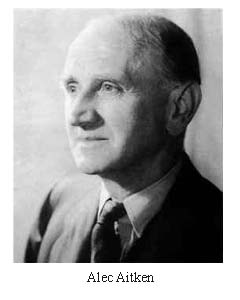
With Aitken's permission I attended his courses, and I learned a great deal from them. For me Aitken was more than an inspiring teacher: he was a caring and sympathetic friend to whom I owe an immeasurable debt of gratitude. Realizing that my modest bursary could not sustain me for more than a few months, he endeavoured to find a source of income for me. He had the felicitous idea of introducing me to Professor (later Sir) Godfrey Thomson, the Professor of Education at Edinburgh. Professor Thomson was interested in using a suitable battery of tests in order to measure a person's intelligence (appropriately defined). The theoretical tools for this investigation required a good deal of mathematics, notably matrix theory which was closely related to my doctoral dissertation.
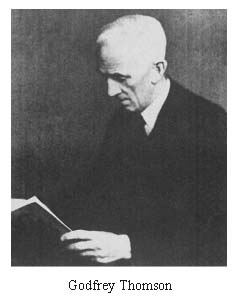
I vividly remember my first interview with Godfrey Thomson in the spring of 1936. After introducing me Aitken left the room, and I was about to have two startling experiences. First, Godfrey Thomson addressed me in German. He spoke the language so well that he might have been taken for a native of the country from which I had fled only recently to escape murderous persecution. He told me that before the First World War he had been a student of physics at Strasbourg, which was then a German city. The second surprise came when (now reverting to English) he offered me the position of mathematical assistant for this research project. I accepted his invitation with alacrity and gratitude. It was to be my first opportunity to have a regular income as a mathematician. To be sure, prior permission had to be obtained from the Home Office to remove the ban on my employment; fortunately this was readily accomplished as the money for Thomson's project came from America, and I was not competing with a British candidate.
My collaboration with Godfrey Thomson was inspiring, creative and intimate. We met daily during the morning break at Moray House, where the Department of Education was situated. After we had briefly surveyed the progress of our research on the previous day, Miss Matthew, his charming and highly efficient secretary, brought in the coffee and some delicious buttered ginger bread. We then discussed the next stage of our work and returned to our rooms. The very intensity with which he pursued his ideas, was a strong stimulus for me to solve the mathematical problems he had passed on to me. Godfrey Thomson did not claim to be a mathematician. Although he understood mathematical formulae when they were presented to him, he preferred to verify his ideas by constructing elaborate numerical examples from which the theoretical result could be guessed with some confidence. It was then my task to give mathematical proofs of his conjectures, which invariably turned out to be correct. In 1937 Godfrey Thomson took a year's leave of absence from the university in order to write his book The Factorial Analysis of Human Ability (University of London Press, 1939), in which he gave a brilliant account of his ideas on the statistical method known as factor analysis. It was said that during that year no one was allowed to see him except the members of his family, his devoted secretary and myself. For part of the year, especially in the summer, he and his wife stayed at their cottage in Ayrshire. But it was evident that Godfrey Thomson did not go there in order to indulge in a holiday; on the contrary, he immersed himself even more fully in his research work and explored new ideas which he communicated to me by post. I have over one hundred letters from him, beautifully written, often in pencil so that he could make a copy produced with the help of a piece of carbon paper. I treasure these documents, not only on account of their scientific value; they also brought out Godfrey Thomson's warm-hearted personality. In his letters he would often refer to my personal anxieties in those harrowing years before the outbreak of the war. (My parents were still in Germany eager to join me in Britain, and my sisters were in Palestine, which was torn by violence and strife.)
In 1937 my work with Godfrey Thomson was interrupted for six months when I accepted an unexpected invitation to fill a temporary vacancy in the mathematics department at Dundee which was then a part of the University of St Andrews. This was my first teaching experience, and I found it extremely hard. My duties included preparing nine lectures each week covering three different subjects in pure and applied mathematics. I found it convenient to prepare my lectures in my office at the College and would sit there until well after midnight writing out my notes. On one occasion I was nearly arrested by the night watchman who thought I was an intruder with evil intentions. I liked Dundee; it was a friendly place, with a pleasant social life among the faculty members. One Saturday evening, when I turned up at the Staff Club, I was told that the programme was a 'Clan Whist Drive' I was at first rather put off by this because I had to confess that I had never played whist and that, with regret, I could not claim adherence to any Scottish Clan. But the organizer of the entertainment reassured me on both points. "We have only three Fergusons here tonight", she informed me, "I am sure they will be pleased to adopt you for this evening so as to complete the team of four players and also teach you how to play whist." The three Fergusons received me with great kindness and evidently found in me an able pupil, for by the end of the evening I had won ten shillings for the Ferguson team which I divided equally between the real and fictitious Fergusons.
After completing the two terms of teaching at Dundee I returned to Edinburgh and continued my collaboration with Godfrey Thomson (as his 'tame mathematician' in Einstein's terminology). I stayed with him for a further twelve months until the autumn of 1938 when I left Edinburgh in order to take up a position in St Andrews. But I made frequent visits to Edinburgh during the next eight years and, whenever possible, called on him and his wife at their beautiful home. Also, we kept up a lively correspondence especially at the time when he was preparing a second edition of his book and my advice was asked for. His last letter to me is dated May 1954, when he congratulated me on the birth of our son but also wanted to know my opinion about a complicated statistical problem that had been raised by another author.
Intensive though my work with Godfrey Thomson was, it did not prevent me from taking part in other stimulating activities. I regularly attended Professor Whittaker's mathematical seminar. The talks given there were of a high standard. Sometimes Professor Whittaker himself would give a series of lectures on topics which in Britain are termed applied mathematics but elsewhere would be called physics. I recall especially a brilliant exposition by Whittaker of a book on elementary particles published by A. Eddington only a few weeks before. At Edinburgh, like at most British universities, the distinction between applied mathematics and physics is not clearly marked. I believe that the fusion of the two subjects is due to the unique genius of Isaac Newton who made fundamental contributions to both mathematics and physics. The very title of his Philosophiae naturalis principia mathematica was used to give the Physics Department at Edinburgh the charmingly atavistic name of Department of Natural Philosophy. The Chair of Natural Philosophy had recently become vacant, and it was offered to Max Born. He was one of the most distinguished scholars who had to leave Germany on account of Hitler's racial persecution. Born had previously been a full professor at Göttingen and thus had occupied one of the most prestigious positions to which a scientist could aspire. He had indeed a world-wide reputation for his outstanding contributions to various branches of theoretical physics. Already as an undergraduate in Berlin I had reason to be grateful for Born's work. When registering for the State Examination I asked my supervisor to give me a topic that would appeal to a mathematician and he selected a treatise by Max Born on the properties of crystals. I enjoyed reading this book, and I made it the subject of my dissertation.
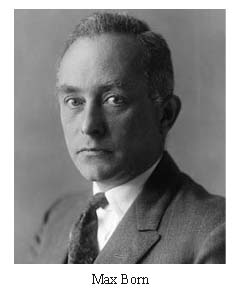
Now I had the exciting experience of meeting the admired author in person. Born was very approachable and kind to the younger members of the department. He and Mrs Born frequently invited me to their house, mostly to take part in playing chamber music. Born was an excellent pianist and we had some delightful musical afternoons together. Sometimes Max Born went for a walk with me and spoke to me about problems in physics that occupied him. One of these was an unpleasant controversy he had with C. V. Raman, the Indian Nobel Laureate. Raman asserted that Born's theory of crystals was unsound, and an acrimonious correspondence ensued which was published in the journal Nature. The arguments put forward were couched in rather general and vague terms. I was able to translate them into rigorous mathematical language and to prove that Born's theory was correct and that Raman's objections were invalid.
Born was very pleased with my intervention and invited me to join his team of research workers and become a physicist. Although I felt greatly honoured by this offer, I declined it because I felt that I could not, on my own, produce original work as a physicist. I have been very conscious of the difference between mathematics and physics, ever since the physics students in Berlin taunted the mathematicians by saying that their work was 'merely formal'. Of course the results of physics are usually expressed in mathematical terms often involving quite advanced mathematical notions. Nevertheless, to the physicist mathematics is but a language, the content being physics, and his aim is to understand of the laws of the universe. The following incident may serve as an illustration: Whittaker had given a seminar on some aspects of Eddington's 'Fundamental Theory' about the constants occurring in nature. In this particular lecture Whittaker had given a brilliant account of the theory of two particles, the proton and the electron, for which Eddington obtained a quadratic equation, whose roots (surprisingly!) are in the ratio of the masses of the two particles. As we were leaving the room after the lecture, Born said to me: "If Eddingtom had considered a system of three particles, I am sure he would have ended up with a cubic equation whose roots are proportional to the masses of the three particles", meaning that in this theory the mathematical formulation took precedent over the physical content.
Born was not offended by my decision not to try to become a physicist. On the contrary he continued to support me in my career as a mathematician.
Shortly after his arrival in Edinburgh Born collected a lively and able group of research students around him. They came from all corners of the world. But as he wistfully reported in his autobiography My Life, p.284 (London 1978) only two came from Scotland. The reason, as he rightly points out, was the fact that a talented British student would endeavour to obtain a scholarship for Cambridge, which would provide better prospects for his career. He questioned whether this monopoly of Oxford and Cambridge was beneficial for British science.
One of Born's research students was Klaus Fuchs who ten years later gained shameful notoriety, as a traitor and spy. I got to know Fuchs quite well. He was a quiet man who lived modestly in some miserable basement lodgings. I knew that he was not Jewish and I assumed that he left Nazi Germany for political reasons. But he never talked about that or anything else for that matter. I do not believe that Fuchs was a wicked person or that he committed treason for personal gain. The most likely explanation of his action seems to me his fear that that the United States which was then the sole owner of atomic weapons would launch a preemptive atomic war against the Soviet Union. Fuchs argued, correctly as it turned out, that if the Russians also had the atomic bomb neither side would dare to start such a war and an unimaginable human catastrophe would be prevented.
Fuchs and I belonged to the same string quartet in which he played the viola rather indifferently and I played first violin. We enjoyed playing together. I remember our last musical evening. Towards the end of the summer term in 1938 it became clear that our quartet would probably never meet again, as each of us had accepted appointments in different parts of the country. We decided to meet on a Saturday evening at the spacious lodgings of the second violin and enjoy a long session performing all the six quartets that make up Beethoven's opus 18. It was a warm summer's evening and, I fear, our host had left one of the windows slightly ajar to increase ventilation. We had only just begun number 4 of opus 18 when there was a heavy bang at the front door. Our host opened the door and found a large policeman standing outside who said with a stern voice: "Is this the flat where all the noise comes from (a less than flattering description of Beethoven's string quartet). It can be heard all over the district. Don't you know it is the Sabbath morning (apparently, it was past midnight). You must stop at once." So our music session ended abruptly by order of the police. As we had expected we never met again.
Max Born was in his fifties when he had to leave Germany and he retained some of the continental attitudes and tastes which younger refugees would have discarded. He loved Scotland; but he felt a strong affinity to continental Europe. As soon as it was possible to travel after the war, Born visited Denmark as a passenger in a small Danish cargo boat that sailed direct from Leith (Edinburgh harbour) to Copenhagen. On his return he related his experiences during a coffee break in his Department: "I am normally a good sailor", he said "but when I saw all the continental sausages and other delicacies on the Danish boat, I nearly became sick through over-indulgence." Whittaker was present at this conversation and commented: "This is an excellent story, Born; I must remember it for your obituary notice." This somewhat indelicate remark was all the more surprising because Whittaker was nine years Born's senior and in fact died long before him. But the incident was an example of Whittaker's preoccupation with the deaths of his colleagues. Every time an eminent mathematician had died, Whittaker used the opportunity of a meeting of the Edinburgh Mathematical Society to deliver a beautifully balanced eulogy of the deceased mathematician, and I began to wonder whether these speeches were not entirely improvised but were enriched by anecdotes he had collected over the years. I also recalled his unexpected remark about Aitken's health at our first encounter.
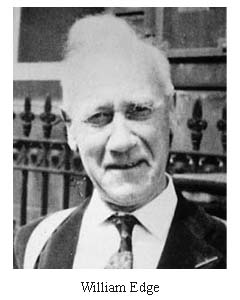
One of the most remarkable members of the Mathematics Department at Edinburgh in the 1930's was W. L. Edge. He was trained at Cambridge and was most strongly influenced by the renowned geometers who were active at Cambridge in the 1920's. Throughout his life Edge produced a steady stream of substantial memoirs of high quality mostly dealing with problems in classical algebraic geometry sometimes referring to the application of group theory. He did not seem to be particularly interested in other branches of mathematics. Edge was deeply attached to Cambridge and was proud to have been an alumnus there. In conversation he frequently said: "When I was at Cambridge." I remember sharing a modest lunch with him in the Refectory during the war, when the only item on the menu was "sausages and chips." After a few bites Edge declared with some disgust: "When I was at Cambridge, we had much better sausages."
He was a life-long bachelor, a tall good looking man, much admired, albeit unilaterally by some of the young ladies in his class room. He was a good lecturer, speaking with a firm melodious voice which had retained a strong native Lancastrian accent. I recall a dinner party at the Whittakers' where several guests, including myself, had come from abroad and spoke with a foreign accent. The guest of honour was an eminent academic whose wife, an upper class English lady, asked each foreign born guest what their country of origin was. Then she turned to Edge and, embarrassingly, asked: "where you do come from?" In his personal relations Edge was aloof and reserved. I have never heard him use the first name when addressing a person, and all his colleagues called him "Edge" at work and began a letter to him with "Dear Edge &."
He expected a high standard from his students. It seems that during the three decades when he was an active faculty member he had only one research student.
Almost throughout his life Edge enjoyed good health. It was his custom every day after lunch to travel by bus to the outskirts of Edinburgh and, after a long and strenuous country walk, to return to the Mathematics Department in the late afternoon. However, some time during the war Whittaker had to tell us that black-out regulations made it necessary to revise the time table and that henceforth some lectures would have to given at two o'clock instead of later in the day. Edge realized that this would deprive him of his favourite country walk at least on some days of the week. He expressed his indignation with the words: "Sir, a gentleman does not work in the afternoon."
Edge was a staunch Roman Catholic. I had the impression that he did not like foreigners, even less when they were Jewish. There were reports that he made derogatory remarks about them. Nevertheless, a person who was relatively close to him was Robin Schlapp, Reader in Applied Mathematics. Robin's parents had come from Germany and his father was Professor of German Literature at Edinburgh University. But Robin was born in Scotland and studied at Cambridge. I suppose this fully legitimized him in the eyes of Edge.
Although Edge was a man of few words in conversation he could express himself well in music He was a very good pianist and was willing to join companions in the joy of chamber music. Robin Schlapp was an excellent cellist and he, too, was lover of chamber music - more about this anon.
The very antithesis to Edge amongst the faculty members was I. M. H. (Ivor) Etherington. (He had been a student at Oxford!) He and his wife frequently offered generous hospitality to colleagues and friends and especially to the victims of Hitler's persecution. Ivor was always ready to help in every possible manner; it was typical of him that he got up from his seat about 10 minutes before the end of the seminar and put the iron kettle on the open fire so that tea could be made for every one as soon as the seminar was over. Later he took on a heavy burden of administrative duties. Etherington had a wide knowledge of mathematics. One could go for a walk with him and talk about one's research problem and be sure that Ivor would listen with understanding and offer useful advice and suggestions. During the 1930's Etherington had adopted some left-wing political ideas and he made no secret of his sympathies. Occasional there were animated but always good-natured discussions over tea after the seminar, when Ivor's views clashed with Whittaker's more conventional and religious convictions; Whittaker was a convert to Catholicism and was strict in his observance.
I played chamber music with friends inside and outside the university. In particular, I was a member of what I might all the Mathematical Piano Quartet. It consisted of Edge (piano), Aitken (violin), myself (viola) and Schlapp (cello). We had not much time to practice together and reached only a modest standard of proficiency. In fact we never got further than playing the two lovely piano quartets by Mozart in g-minor and e-flat major respectively. Nevertheless, our quartet played a distinctive social role in the Mathematics Department. The meeting of the Edinburgh Mathematics Society usually took place in the evening of the first Friday of each month during the academic term. On the evening after the meeting Sir Edmund and Lady Whittaker always gave a dinner party at their beautiful house to which the speaker at the Seminar and other guests were invited. Whittaker did not like trivial conversation. Therefore he always invited guests who would entertain the company with some musical offering, and this invariably included our quartet. The dinner was very formal, such as might be described in a Victorian novel. First soup was served and then fish. This was followed by meat, usually roast beef. But since the dinner took place on a Friday, Whittaker and Edge, being strict Catholics, refrained from eating meat and were served a second helping of fish. After the dessert had been eaten, the ladies left the dining room and went upstairs, the men staying behind. When a suitable time had elapsed, Whittaker said: "Gentlemen, shall we join the ladies?" Then all the guests settled down in the drawing room around the piano and Whittaker asked for musical contributions. When Turnbull was among the guests he usually started off; he was a good pianist, and did not seem to mind playing before an audience. Sometimes other solo pieces were played on the piano. But the main item in the programme was undoubtedly our piano quartet. On alternate months we played one or the other of the Mozart quartets, since alas these were our total repertory. This continued for several years. But Whittaker always applauded us with the words: "This was delightful; have I heard it before?" During one month there was a minor crisis: an extra meeting of the Edinburgh Mathematical Society was to take place, at which a distinguished visitor was going to give a lecture. As usual, there was going to be a dinner party at the Whittaker's, to which the quartet was invited. But Aitken said: "We can't play the Mozart quartet again; we have just done it. Let us try something else!" We met at Edge's lodgings for a rehearsal and played a little of one of the Brahms quartets. However, it soon became clear it was too difficult and that we should be unable to master in the short time at our disposal. So with his whimsical humour Aitken suggested: "Let us play a simple Haydn trio for piano, violin and cello and Walter will look at a music stand in front of him and pretend to play his viola, so that it looks as if we were performing a quartet." We rehearsed the sham quartet for a while; but we soon gave it up since we could not hide our mirth and moreover realized that our deception would surely be discovered in the confined space of the Whittaker's drawing room. So we decided, of necessity, to play one the Mozart quartets after all. The performance went well and was warmly praised by Whittaker with the words: "This was delightful. Have I heard it before?"
My experiences at Edinburgh are very precious to me. It is a beautiful city; in the years when I lived there even more so than today after some of the picturesque establishments have been replaced by chain stores and mass-produced eating places. There was a flourishing cultural life and an attractive neighbourhood which offered refreshing walks and excursions. Although I was not a registered student or member of faculty at the University I have formed a lasting bond with the academic institutions that are associated with Edinburgh. In 1940 I was awarded the degree of Doctor of Science for my contributions to Godfrey Thomson's research programme which he had published in The Factorial Analysis of Human Abilities, a book that rapidly went to several editions. In 1944 I was elected a Fellow of the Royal Society of Edinburgh; I regret that I am now unable to attend its meetings; but I am always pleased to be informed about its activities and to be reminded of my life in Edinburgh.